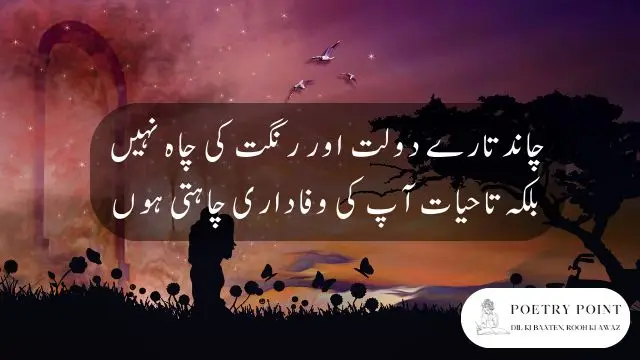Urdu Poetry: Capturing the Essence of Love and Desire
Urdu poetry has the remarkable ability to portray intense emotions in just a few words. This poem conveys the essence of passion, desire, and devotion in a beautifully articulated form. It reflects the yearning of the lover to be held, kissed, and loved by the beloved, capturing the intensity of emotions that often accompany romantic relationships. As we explore this poem in different versions—**Urdu**, **Roman Urdu**, **English Translation**, and **Hindi Script**—we will also delve deeper into the nuances of love and longing in Urdu literature.
Original (Urdu):
مجھے چوم کر مجھے تھام کر
میری شدتوں میں قیام کر
اے دلربا نازک ادا تجھ پر فدا
ایک شب تو میرے نام کر
Roman Urdu (Transliteration):
Mujhe choom kar, mujhe thaam kar
Meri shiddaton mein qayaam kar
Ae dilruba, naazuk ada, tujh par fida
Ek shab to mere naam kar
English Translation:
Kiss me, hold me
Stay in my intense moments
O delicate beloved, I am devoted to you
Give me one night in my name
Hindi Script:
मुझे चूम कर, मुझे थाम कर
मेरी शिद्दतों में क़याम कर
ऐ दिलरुबा नाज़ुक अदा तुझ पर फ़िदा
एक रात तो मेरे नाम कर
Exploring the Passion in This Poem
This poem, though short, is filled with intense emotions of longing and desire. The opening lines, “مجھے چوم کر مجھے تھام کر” (Kiss me, hold me), set the tone for a passionate plea from the lover to the beloved. This plea is not just for physical closeness, but for an emotional connection that transcends ordinary moments, asking the beloved to stay during the lover’s intense emotional state.
The poet continues by expressing devotion to the beloved through the line “اے دلربا نازک ادا تجھ پر فدا” (O delicate beloved, I am devoted to you). Here, the beloved is described with tenderness, emphasizing their delicate and graceful nature. The word “فدا” (fida) means devoted or sacrificed, often used in Urdu poetry to express deep, unconditional love and admiration.
The final line, “ایک شب تو میرے نام کر” (Give me one night in my name), is a beautiful request for a single night of togetherness, where the lover seeks the undivided attention and love of the beloved. This theme of fleeting moments of love is common in Urdu poetry, where poets often reflect on the temporary nature of life and love, and the desire to make the most of those brief, precious moments.
The Symbolism of Night in Urdu Poetry
The night is a recurring symbol in Urdu poetry, often representing intimacy, secrecy, and the moments when true emotions are revealed. In this poem, the request for “ایک شب” (one night) symbolizes not just physical closeness, but a deeper emotional connection that is shared in the stillness of the night. Many classical Urdu poets, such as Ghalib and Faiz, have used the metaphor of night to convey emotions of love, longing, and even existential reflection.
In this context, the night represents a sacred time when the lover and the beloved can be together, away from the distractions of the world. It is during these moments of solitude that true love is expressed and understood. The night also serves as a metaphor for the inner world of the lover, a place where emotions run deep and desires are felt more intensely.
Roman Urdu: A Modern Tool for Cultural Preservation
Roman Urdu has become a popular way for Urdu speakers to engage with their language in a digital age where typing in the Nastaliq script is not always convenient. For younger generations, especially those living outside of South Asia, Roman Urdu offers a bridge to their cultural heritage, allowing them to connect with the beauty of Urdu poetry without needing to master the Urdu script.
In this poem, the use of Roman Urdu allows readers to appreciate the rhythm and flow of the original Urdu language, even if they are not able to read the Nastaliq script. This accessibility has helped keep Urdu poetry alive and relevant in modern times, ensuring that it continues to inspire and move readers across the world.
Challenges in Translating Passionate Urdu Poetry
Translating Urdu poetry, especially when it involves themes of passion and desire, presents unique challenges. Urdu, with its rich vocabulary and subtle layers of meaning, often conveys emotions in ways that are difficult to capture in English. For instance, the word “فدا” (fida), used in this poem, carries connotations of both devotion and sacrifice, a nuance that is not fully expressed in the English word “devoted.”
Similarly, the intensity of the word “شددت” (shiddat), which means intensity or fervor, is difficult to translate into English without losing some of the emotional depth. While English translations help make Urdu poetry accessible to a global audience, they often lack the emotional richness and cultural context that makes Urdu poetry so powerful. However, through careful translation, much of the original sentiment can still be conveyed, allowing readers to connect with the poet’s emotions.
Hindi Script: Expanding the Reach of Urdu Poetry
By offering Urdu poetry in Hindi script, we enable a larger audience to experience the beauty of this literary tradition. Hindi and Urdu share many linguistic similarities, and by making this poem available in Devanagari, we allow Hindi readers to appreciate the emotions expressed in the original Urdu.
Urdu and Hindi, despite their different scripts, have deep cultural and linguistic connections. Offering Urdu poetry in Hindi script is a way to celebrate this shared heritage and ensure that more people can connect with the timeless emotions conveyed through these words.
The Timeless Themes of Love and Longing in Urdu Poetry
Love, longing, and desire are recurring themes in Urdu poetry, often explored through metaphors and symbolic imagery. This poem, with its focus on the physical and emotional closeness of the beloved, is a reflection of the universal human experience of wanting to be close to someone we love. The idea of devotion, expressed through the word “فدا” (fida), highlights the deep emotional bond that exists between the lover and the beloved.
The request for “one night” in this poem is symbolic of the fleeting nature of love and life, a theme that resonates throughout Urdu poetry. In many ways, this poem reflects the tension between the temporary and the eternal, a tension that has been explored by countless Urdu poets over the centuries.
Conclusion: The Power of Poetry in Connecting Hearts
This poem captures the intense emotions of love, desire, and longing, showcasing the beauty and depth of Urdu poetry. Whether read in **Urdu**, **Roman Urdu**, **English**, or **Hindi**, the emotions conveyed in these lines remain universal, connecting readers across languages and cultures. Urdu poetry has a unique ability to express the most profound human emotions, making it timeless and relevant in any era.
As we continue to share and explore Urdu poetry in the modern digital world, its themes of love and devotion will continue to resonate with readers, reminding us that, no matter how much the world changes, the language of love remains the same.







